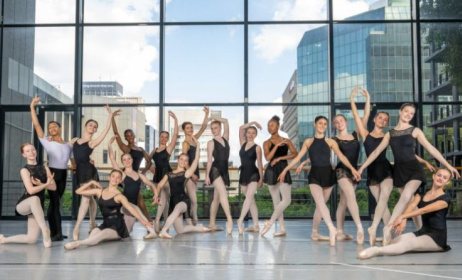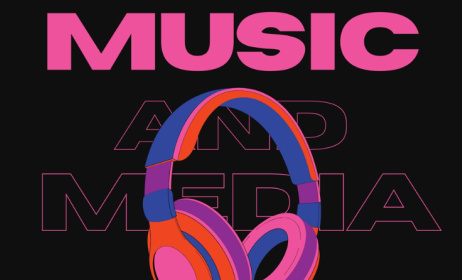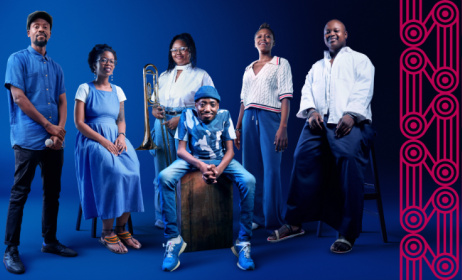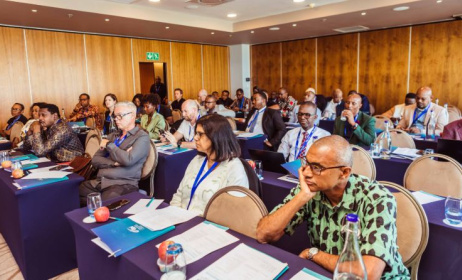Interview: SA’s Toya Delazy on her new musical direction with Afrorave Vol. 1
In a cosmetic world laden with alternative musicians who are hopelessly trying to look more intriguing than they are – with unusual pictures and outlandish outfits yet mediocre music – UK-based South African musician Toya Delazy’s idiosyncratic vision and authenticity set her apart from the rest. She’s pushed the boundaries with her recently released fourth album Afrorave Vol. 1, which she delivers purely in her native Zulu tongue.
 Toya Delazy.
Toya Delazy.
The album spells the end to the artist’s musical hiatus after she relocated to London following her rapid rise to stardom in South Africa. Although away from home, the video for one of her lead singles, ‘Qhawe’, has been nominated for Best Produced Music Video at this year’s South African Music Awards (SAMAs). Afrorave Vol. 1 is Toya’s second collection released independently since the rapper ditched Sony Music due to the label’s conflicting creative direction. “Creativity is my everything. It’s my healing, my sense of self, my expression, it’s who I am, so it can’t be polished,” she says.
Toya’s insatiable hunger to express her individuality and creativity has taken her on a self-fulfilling journey of discovery and introspection. Ironically, her decision to rap in Zulu has been better received in the UK than in South Africa, enabling her to hold onto something that is hers while sharing it with a wider audience.
“Whenever I’d speak or rap in Zulu in South Africa, people wouldn’t want to hear it. They wanted the English-speaking Toya. So I wanted to reclaim it. We need to stop looking down on ourselves so much, not believing that greatness can come from the soil.”
Since relocating to the UK in 2015 she has caught the eye of various producers at cyphers, thereby inviting more collaborators and experimentation that have led to the blueprint of her new, distinctive sound. By 2018, her self-produced hit ‘London Town’ entered the charts and helped her gain new followers interested in her unconventional art.
“Music is a fit: you have to eventually find your lane and find out what exactly you are giving to the world. And being overseas, I was like, ‘I’ve got so much culture!‘ It’s a pity that in South Africa they make us think our culture is not worth anything.”
Afrorave Vol. 1 unfolds with concepts of rebirth and breaks away from the regressive social constructs that limited Toya’s artistic freedom back in South Africa. The notion of rebirth is best illustrated on the lead single ‘Resurrection’ – a bold statement and somewhat a forewarning of an awakened spirit ready to take over the world. With subtitles added to the song’s video, the artist invites English-speaking viewers to appreciate the depth of Zulu poetry, which would otherwise be missed.
“I think resurrection is like, ‘Well they buried us not knowing we’re seeds, because here we are.’ In a way, it’s time for the African child to resurrect. There’s a lot that’s happened to Africans, which needs to be addressed. It’s also a play on words, with me coming back with a new steez and of course a return to normal from the lockdown.”
Toya’s latest music is a significant departure from her 2012 debut album Due Drop, which clinched the Best Newcomer and Best Pop Album of the Year SAMAs in 2013. Her new compositions are characterised by daring musicianship, the articulation of deep sentiments and abstract constructions. In addition to elements of jazz, electro, hip hop and punk, her new sound adds ’Afro-rave’, which she defines as an unapologetic alternative African genre that celebrates indigenous languages through rave music, which includes “left-field bass, techno, and drum and bass.”
“That doesn’t happen often. I relate with it because Zulus traditionally had a similar sound. We called it indlamu where you get lost in the drums. So I just discovered that correlation, which has now connected me to my global space. But also, I’m still holding on to my tradition and heritage, which is important.”
Her latest album can be interpreted as a sonic bridge of the past and future. It encourages the listener to reimagine the experience of people of colour. However, its ideas transcend racial lines with messages of self-awareness, free expression and empowerment. Much like the early pioneers of Afrofuturism, like Sun Ra, Afrorave Vol. 1 is fixated on universal suffering, social commentary and enhancing the lives of all people, taking Afro-rave away from being a purely black concept and interweaving it into ideas of the ‘other’. Much like Afrofuturism, the cross-fertilisation of ideas and eccentricity have always been central for Toya.
Beyond its cultural aesthetics, the album is peppered with dark, weighty lyrics and an urgent call to rethink archaic ideologies that ostracise the unknown. She reflects on the harsh realities and less salient challenges she experienced during the COVID-19 pandemic – when music became her catharsis. On ‘Tini’, for instance, she touches on the oft-overlooked topic of mental health in black communities, an issue that became painfully apparent during the lockdown.
To emphasise the gravity of her messages, she joined forces with regular collaborators Young Mbazo – a group comprising the children and grandchildren of Ladysmith Black Mambazo’s original members. Together they created ‘Onakho’ and ‘Vuka’, meaning ‘wake up’, which continues the resurrection theme. It’s a plea to awaken African consciousness to the harsh social realities at play among an apathetic youth.
“I feel like the youth is going through a lot of things – like people chilling with doctorates at home. So I’m urging the youth to wake up. We’ve been repressed for so long and nobody is coming to save us. We’ve got no leaders,” Toya Delazy says.


































Comments
Log in or register to post comments